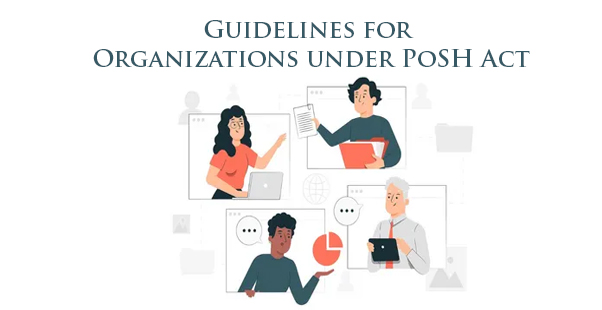Introduction:
The Prevention of Sexual Harassment (PoSH) Act is a legal framework designed to ensure safe and respectful work environments. It places the responsibility on organizations to actively prevent and address incidents of sexual harassment in the workplace. To comply with the provisions of the PoSH Act, organizations need to establish comprehensive guidelines that promote a culture of dignity, equality, and respect for all employees.
In this article, we will explore essential guidelines that organizations should follow to effectively implement the PoSH Act and create an environment where every individual feel’s protected, valued, and empowered. By adhering to these guidelines, organizations can demonstrate their commitment to fostering safe and inclusive workplaces while upholding the rights and well-being of their employees.
It is a crucial legislation designed to prevent and address incidents of sexual harassment in the workplace. It places the onus on organizations to create safe and respectful environments for their employees. To effectively comply with the provisions of the PoSH Act, organizations need to adopt specific guidelines and measures.
1. Frame a PoSH Policy:
Every organization covered under the PoSH Act must establish a comprehensive PoSH policy. This policy should clearly define sexual harassment, provide examples of unacceptable behaviour, specify reporting procedures, and emphasize zero tolerance. The policy should be compliant with PoSH Act, 2013
2. Form an Internal Complaints Committee (ICC):
Organizations should form an ICC, consisting of both internal and external members. The ICC should be responsible for receiving complaints, conducting investigations, and recommending appropriate actions. It should comprise at least one external member to ensure impartiality.
3. Appoint a Nodal Officer:
Designate a nodal officer responsible for coordinating all matters related to sexual harassment prevention and the PoSH Act. This individual should serve as a point of contact for employees seeking assistance or reporting incidents.
4. Conduct Regular Awareness Programs:
Organizations must conduct regular awareness programs to educate employees about sexual harassment, their rights, and the reporting mechanism. These programs can include workshops, training sessions, and informative campaigns to raise awareness and promote a culture of prevention.
5. Ensure Confidentiality and Privacy:
Maintain strict confidentiality and privacy throughout the complaint handling process. Protect the identity of the complainant, witnesses, and accused individuals to prevent victimization or retaliation.
6. Promptly Investigate Complaints:
The ICC should initiate timely and impartial investigations upon receiving a complaint. The investigation process should adhere to principles of natural justice, ensuring fair treatment of all parties involved.
7. Provide Support to Complainants:
Offer support mechanisms to complainants throughout the investigation and resolution process. This can include providing counselling services, legal assistance, or any other required support to ensure their well-being.
8. Implement Disciplinary Actions:
Organizations should establish a system for imposing appropriate disciplinary actions against individuals found guilty of sexual harassment. Ensure that these actions are proportionate to the severity of the offense and consistently enforced.
9. Maintain Documentation:
Maintain proper records of all complaints, actions taken, and outcomes. This documentation serves as evidence of the organization’s commitment to addressing sexual harassment and demonstrates compliance with the PoSH Act.
10. Regularly Review and Update Policies:
Periodically review and update the PoSH policy and related procedures to align with changing legal requirements and best practices. Stay informed about developments in the field of preventing sexual harassment and incorporate them into organizational policies and practices.
11. Appointment of External Panel Members
It is mandatory as per PoSH Act 2013 to appointment an external panel member for every IC committee. Role of external panel is to ensure the case is handle in a legally compliant manner. They also ensure there is no element of bias in the investigation.
Conclusion:
Adhering to the guidelines outlined under the PoSH Act is crucial for organizations to create safe and inclusive work environments that are free from sexual harassment. By implementing these guidelines, organizations demonstrate their commitment to preventing and addressing incidents of sexual harassment and promoting a culture of respect and equality.
The establishment of a comprehensive PoSH policy, the formation of an Internal Complaints Committee (ICC), regular awareness programs, confidentiality and privacy measures, prompt and impartial investigations, disciplinary actions, documentation, and periodic policy reviews are key elements for organizations to comply with the PoSH Act effectively.
From these guidelines, organizations not only fulfil their legal obligations but also foster a work environment that prioritizes the well-being and dignity of their employees. These guidelines empower individuals to report incidents without fear of retaliation, provide support to complainants, and ensure fair and just resolution processes.
Creating a workplace that is free from sexual harassment requires continuous effort, awareness, and a commitment to ongoing improvement. Organizations must strive to create a culture of respect, inclusivity, and accountability, where every employee feels safe and valued.
By implementing the guidelines provided by the PoSH Act, organizations can contribute to building a society where gender-based discrimination and harassment are eradicated, allowing individuals to thrive and reach their full potential in a supportive and respectful work environment. Together, we can create workplaces that set the standard for dignity, equality, and empowerment.
Complying with the guidelines outlined under the PoSH Act is crucial for organizations to foster safe, respectful, and inclusive workplaces. By developing a robust PoSH policy, establishing an ICC, conducting awareness programs, ensuring confidentiality, promptly investigating complaints, implementing disciplinary actions, and maintaining documentation, organizations can effectively prevent and address incidents of sexual harassment. These guidelines promote a culture that prioritizes the well-being and dignity of all employees, contributing to a harmonious and productive work environment. It is the responsibility of every organization to strictly adhere to these guidelines and actively work towards creating workplaces free from sexual harassment.

